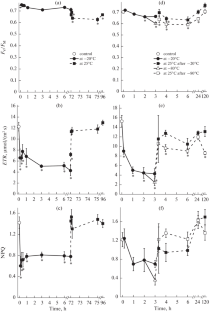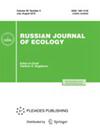Photosynthetic Apparatus of Hylocomium Brilliant Moss Resistant to Extreme Low Temperatures
IF 0.6
4区 环境科学与生态学
Q4 ECOLOGY
引用次数: 0
Abstract
The influence of positive and negative temperatures, as well as dehydration/rehydration on the maximum photochemical efficiency, the electron transfer rate in photosystem II, and non-photochemical moss quenching of Hylocomium splendens, which is widespread in the boreal forests of the Northern Hemisphere, is shown. It was found that this moss is resistant to low (–20 and –80°C) temperatures and significant water losses. On the contrary, in the hydrated state, it is unstable to prolonged exposure to positive temperatures (40°C). High resistance to low temperatures and dehydration allowed H. splendens to successfully adapt to growing in northern latitudes and occupy a vast area.

耐极度低温的艳苔光合装置
摘要 研究显示了正负温度以及脱水/再脱水对广泛分布于北半球北方森林中的白芨芨草(Hylocomium splendens)的最大光化学效率、光系统 II 中的电子转移率以及非光化学苔藓淬灭的影响。研究发现,这种苔藓对低温(-20 和 -80°C)和大量失水具有抵抗力。相反,在水合状态下,长时间暴露在正温(40°C)下也不稳定。对低温和脱水的高抵抗力使白芨成功适应了在北纬地区的生长,并占据了广阔的区域。
本文章由计算机程序翻译,如有差异,请以英文原文为准。
求助全文
约1分钟内获得全文
求助全文
来源期刊

Russian Journal of Ecology
环境科学-生态学
CiteScore
1.50
自引率
18.20%
发文量
40
审稿时长
6 months
期刊介绍:
The Russian Journal of Ecology publishes completed original studies in all branches of theoretical and experimental ecology, reviews, articles on topics currently in debate, and information on new methods of research.
 求助内容:
求助内容: 应助结果提醒方式:
应助结果提醒方式:


